Introduction
Great leaders don’t blame; they take ownership and inspire others to do the same.
As a leader or manager, you must have faced moments when things didn’t go as you planned. There were missed deadlines, miscommunications, or projects that fell short of expectations. In those situations, it’s easy to point fingers or shift blame. But leadership is never about finding fault. It’s about stepping up, taking responsibility, and creating a culture of accountability.
Leadership accountability is the foundation of successful teams and organizations. Why? Because accountability starts at the top. As leaders, we set the tone. When we own our decisions, actions, and mistakes, we inspire our teams to do the same.
I’ve been in your shoes. I’ve led teams through challenges, celebrated wins, and learned from failures. One of the most valuable lessons I’ve learned over my 25+ years in the IT industry is this – accountability isn’t only about fixing problems. It’s more about building trust, encouraging collaboration, and driving results. When leaders take ownership, they create an environment where people are empowered, valued, and motivated to give their best.
In this article, you’ll learn what leadership accountability is, why it matters, and how you can develop it. Whether you’re a seasoned leader or just stepping into a managerial role, this article will help you create a culture of ownership that drives success.
What is leadership accountability?
Leadership accountability is all about leaders owning up to their actions, decisions, and their consequences – good or bad. An accountable leader doesn’t shift blame when things go wrong or take credit for someone else’s hard work. Instead, they set clear expectations, manage their teams effectively, lead by example, and make sure that they support their team.
For example, if you make a mistake in a project. As an unaccountable leader might say, “It wasn’t my fault, the team didn’t follow instructions.” But a true leader steps up and says, I could have communicated better. Let’s figure out what went wrong and improve for next time.
Explore top 17 team management software to keep your teams productive and organized!
So, how is accountability different from responsibility?
What is the difference between Accountability and Responsibility?
These two words are often mixed up, but they’re not the same. Responsibility is only about assigned tasks (what you’re supposed to do).
On the other hand, Accountability is all about taking ownership (making sure something gets done and owning the outcome).
Let’s understand with an example – Suppose a marketing manager assigns a teammate to create a campaign. The teammate is responsible for designing it, but the manager is accountable for its success or failure.
If the campaign doesn’t perform well, an accountable leader won’t just say, “That was your job.” Instead, they’ll reflect on what went wrong, whether the goals weren’t clear, or the team needed more support, and work on finding solutions.
It’s a simple equation: When leaders take accountability, they set a standard that inspires the whole team to do the same. And that’s when real progress happens.
Also read – What is team leadership? A comprehensive guide
Why is accountability important in leadership?
“A good leader takes a little more than their share of the blame and a little less than their share of the credit.” – Arnold H. Glasow
Accountability is the glue that holds commitments, trust and results together. When leaders take ownership of their actions, it shows they’re reliable and trustworthy. It also sets a positive example for everyone else.
If a leader avoids accountability, it sends the message that it’s okay to pass the buck or make excuses. But when their leaders step up, it inspires others to do the same.
In short, leadership accountability is more than just admitting mistakes. You need to learn from them, grow, and create a culture where everyone feels empowered to do their best. And that’s why it matters so much!
What are the benefits of leadership accountability?
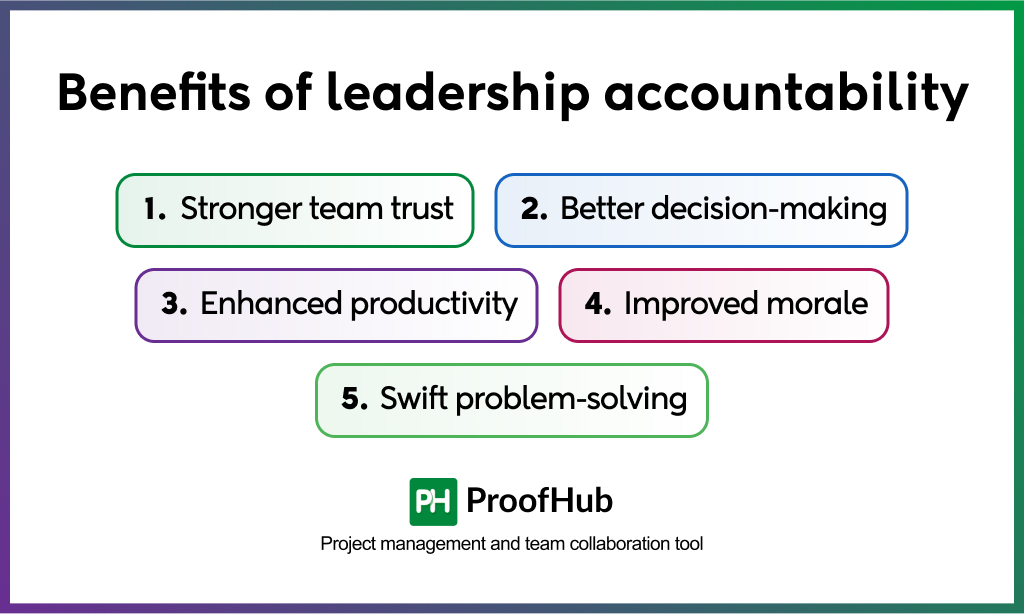
- Stronger team trust: When leaders own up to their mistakes, it sends a strong message – “It’s okay, you are human, and everyone makes mistakes”. Your team feels safer and more valued because they know their leader is honest and transparent. When your team trusts you, they collaborate better and feel more connected, building a strong and high-performance team.
- Better decision-making: Accountable leaders think twice before making decisions because they know they’ll have to stand by them. This careful evaluation can help you make smarter, more thoughtful choices.
- Enhanced productivity: When you are clear about your expectations and take responsibility for your role, it reduces confusion in your workplace. Your team members know exactly what’s expected of them and can focus on their work without second-guessing. This clarity boosts efficiency and helps everyone stay on track.
- Improved morale: Let’s be honest – no one likes working for a leader who points fingers or shifts blame. But when you own your actions, it builds respect. Your team members get motivated and proud of their work when they see their leader leading with integrity.
- Swift problem-solving: Mistakes happen, it’s part of daily-life. But when leaders acknowledge issues quickly and take steps to fix them, problems get resolved faster. This proactive mindset prevents small issues from turning into big headaches.
What are the 5 Cs of leadership accountability?
Leadership accountability is the foundation of trust, teamwork, and success in any organization. But what does it actually mean to be an accountable leader?
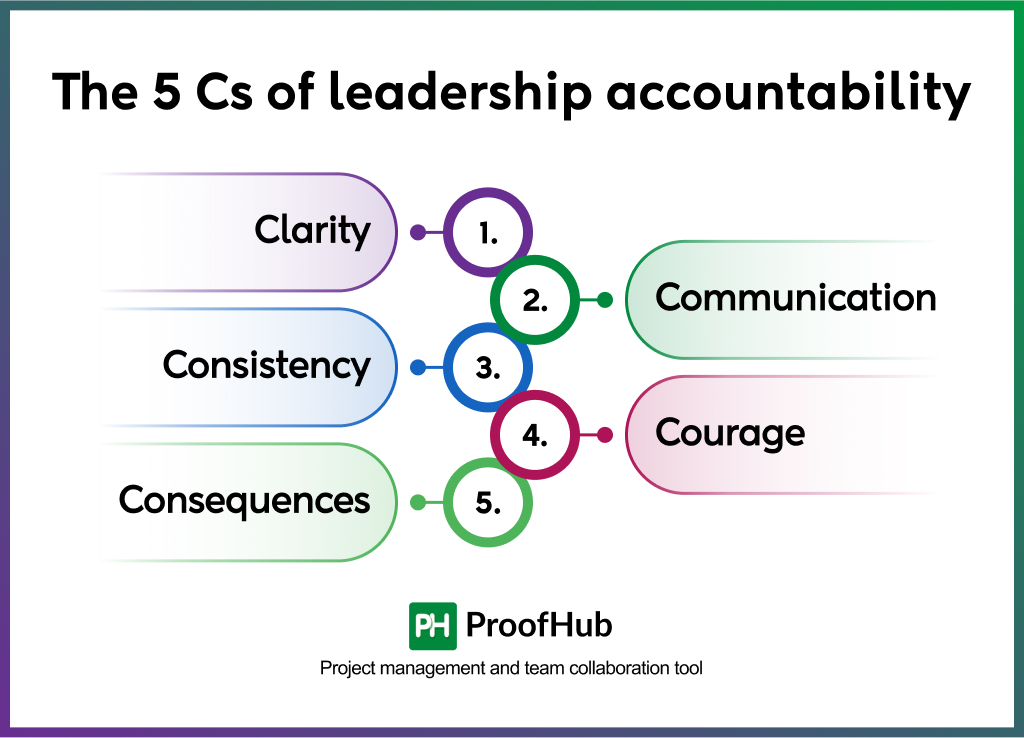
That’s where the five Cs of leadership accountability comes in. These five Cs can help leaders like you not only talk the talk but walk the walk.
1. Clarity: If no one knows what the goal is, how can they achieve it? So, as a leader, you need to define expectations, roles, and responsibilities from the start. When expectations are vague, accountability is compromised.
2. Communication: How can your team take ownership if they don’t feel heard? Accountability is not about confrontations, it’s about conversations. So, create an environment where people feel comfortable discussing responsibilities and challenges. Open and effective communication can help you prevent small issues from turning into major setbacks.
3. Consistency: Do you hold yourself to the same standards you expect from your team? Accountability is not a part-time job. You need to demonstrate it consistently, not just when things are going well. If a leader holds their employees to high standards but makes excuses for their own mistakes, trust erodes.
4. Courage: Are you willing to own your mistakes, even when it’s tough? Leaders who acknowledge their failures gain more trust from their teams. However, holding yourself accountable takes courage. It’s easy to celebrate wins, but real leadership shows when things go wrong. You need strength to admit your mistakes, make tough calls, and stand by decisions.
5. Consequences: Does your team understand the “why” behind every reward or reprimand? Your actions have consequences, whether they are positive or negative. Recognizing good work can help you reinforce accountability while addressing poor performance, which ensures fairness. So, be transparent. Your team needs to know the “why” behind every consequence.
What are the common challenges in practising leadership accountability?
Even the best leaders struggle with accountability. It’s not always easy to be fair, supportive, and clear while holding your team members (and yourself) responsible for results.
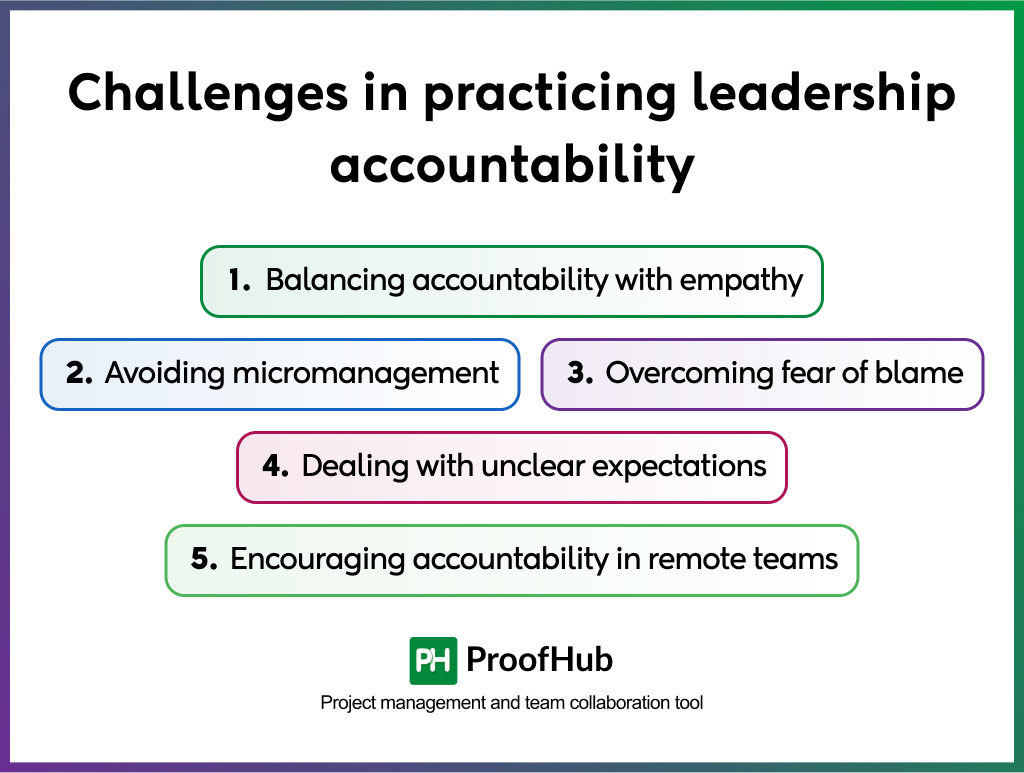
Here are some common challenges that you can face:
1. Balancing accountability with empathy
Holding someone accountable doesn’t mean being harsh or unsupportive. If you want to be a good leader, you need to find a balance between setting expectations and offering support. If you are too strict, your team can feel pressured or discouraged. If too lenient, performance can slip.
For example, if a team member misses a deadline, rather than just pointing out the mistake, ask, “What obstacles did you face? How can I help you succeed next time?” This leadership style shows you care while still emphasizing the importance of meeting expectations.
2. Avoiding micromanagement
Nobody likes a boss who hovers over their shoulder, checking every little detail. But how do you hold people accountable without micromanaging? You need to trust them. Set clear goals, provide the tools and support they need, and then step back.
For instance, rather than asking for hourly updates, you can schedule weekly check-ins to discuss progress. This gives your team members the freedom to work while keeping them on track.
3. Overcoming fear of blame
Fear of punishment can make any team member hide their mistakes instead of learning from them. So, you need to create a culture where mistakes are seen as opportunities to grow.
For example, when a project goes wrong, focus on what can be learned rather than finding out who’s at fault. Instead of saying, “Who messed this up?”, you can say, “Let’s figure out how to improve next time” to build a supportive work culture of continuous improvement.
4. Dealing with unclear expectations
Only 45% of employees clearly know what’s expected of them at work. This lack of clarity kills accountability. If your team members don’t know what’s expected of them, how can they meet those expectations? To fix this, you can set SMART goals for clear expectations.
For example, instead of vague instructions like, “Do your best on this project,” you can provide specific guidance, “The deadline for this project is Friday at 5 PM. You need to deliver a report with detailed analysis and a visually engaging presentation.”
5. Encouraging accountability in remote teams
Remote work can make accountability trickier because you can’t just walk over to someone’s desk to check in. But with the right tools and communication, it’s totally doable.
Just like it is with project management tools like ProofHub where you can create and assign tasks, set deadlines, track your team progress, provide feedback, and collaborate in real-time. These tools make sure that everyone stays connected, knows their responsibilities, and feels comfortable asking for help when needed.
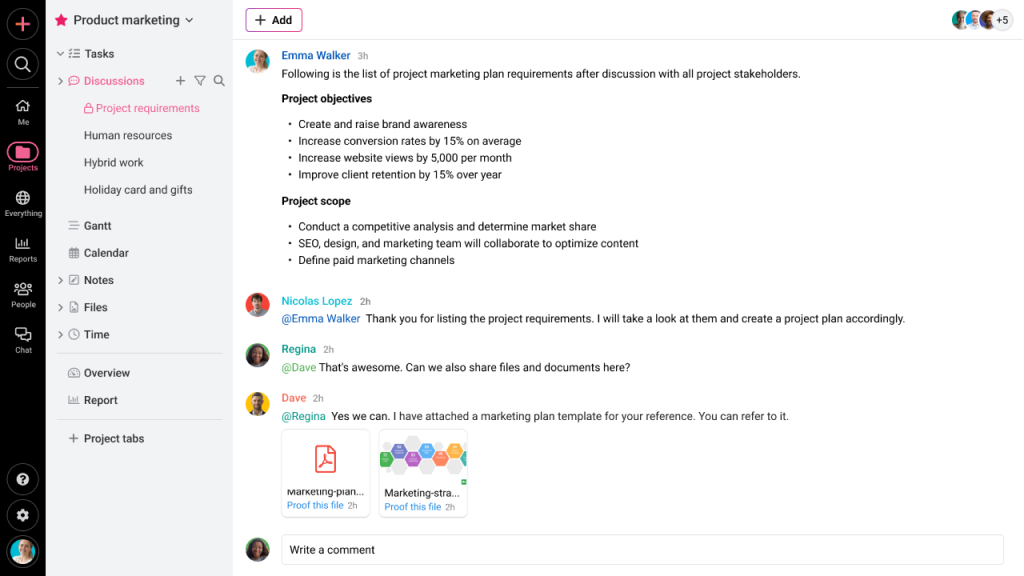
7 Effective tips for developing leadership accountability
Leadership accountability builds trust, creating a culture of honesty and reliability. Your team members are more confident and motivated when they know their leader has their back.
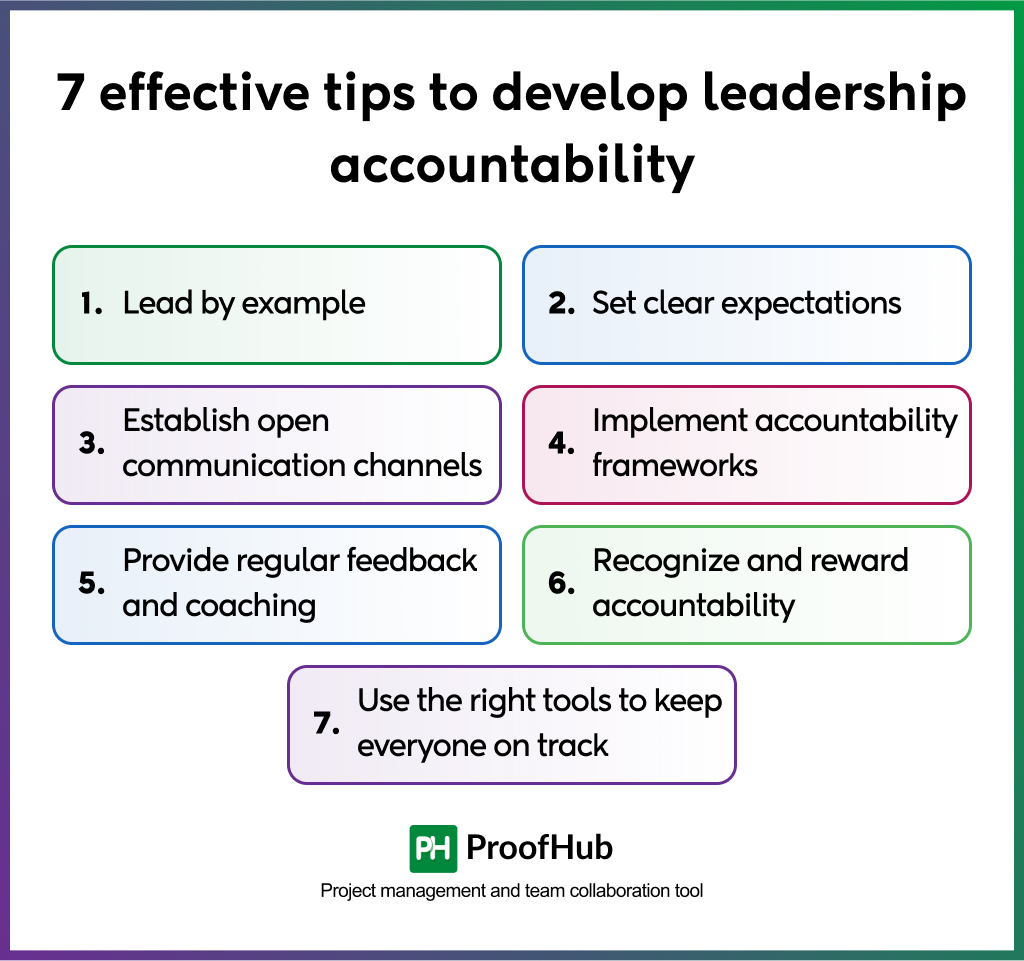
Here are a few practical tips for you to develop leadership accountability:
1. Lead by example
“A leader is one who knows the way, goes the way, and shows the way.” – John C. Maxwell
If you want your team members to be accountable, you need to own your decisions. Show up on time, meet deadlines, and admit when you’ve made a mistake.
For example, if a project misses a deadline, don’t point fingers at others. Instead, say, “I should have checked in sooner. Let’s figure out how to avoid this next time.” When your team sees you taking responsibility, they’ll follow suit.
Explore 13 leadership skills you need to lead your team successfully!
2. Set clear expectations
Unclear expectations lead your teams to confusion and missed deadlines. Only 45% of employees know what’s expected of them at work. Without clarity, accountability becomes impossible.
So, define clear goals, responsibilities, and deadlines for every task. When your team members know exactly what they need to do, they will follow through efficiently.
For instance, rather than saying, “Let’s improve sales,” you can say, “Our goal is to increase sales by 10% this quarter. Here’s how each of you can contribute.”
3. Establish open communication channels
Accountability prospers in an environment where people feel comfortable speaking up. If your team members fear criticism or judgment, they will hide their mistakes instead of fixing them.
So, encourage real-time team collaboration and open conversations in your workplace through regular check-ins, team meetings, and one-on-one discussions.
You can also ask these questions to understand your team better:
- “What challenges are you facing?”
- “How can I support you better?”
- “Do you have the resources you need?”
When you, as a leader, actively listen and create a space for honest feedback, accountability becomes a natural part of your team culture.
4. Implement accountability frameworks
Having a system in the workplace to track progress and responsibilities makes sure that you and your team don’t miss any tasks.
Accountability frameworks like Objectives and Key Results (OKRs) and Key Performance Indicators (KPIs) can help you track your team progress, building accountability in the workplace.
For example, if your objective is to launch a new product, your key results may include completing the design by a certain date, testing it with users, and finalizing the marketing plan.
This makes sure that everyone knows what they’re responsible for and how their work contributes to the overall goals.
5. Provide regular feedback and coaching
Feedback is never about pointing out mistakes. It’s more about helping your team grow. In fact, 72% of employees believe corrective feedback helps them improve when delivered properly.
So, instead of waiting for annual reviews, you can make feedback a regular part of your leadership approach. Provide timely and constructive feedback to build an environment of trust and continuous improvement.
For example, if someone in your team misses a deadline, instead of saying, “You’re late,” try, “I noticed the report was delayed. What challenges did you face, and how can I support you next time?” Regular coaching helps your team members learn from their experience and take responsibility for their work.
6. Recognize and reward accountability
People repeat behaviors that get recognized. So, when your team members take ownership of their work, meet deadlines, or help others stay on track, acknowledge their efforts.
To do so, you can opt for public recognition, bonuses, or career growth opportunities, reinforcing accountability. When your team members see that accountability is rewarded and appreciated, they adopt it as a habit.
To recognize them, you can just say – “Great job on leading that project to completion!”. This simple statement can make their day and they will work more dedicatedly.
7. Use the right tools to keep everyone on track
Digital tools like ProofHub can help you organize your tasks, track progress, and ensure transparency in the workplace.
ProofHub is an all-in-one project management and team collaboration tool that allows you to create task lists, set reminders, and monitor progress in real-time. You can assign clear responsibilities to team members, set deadlines, and keep track of important discussions – all in one place.
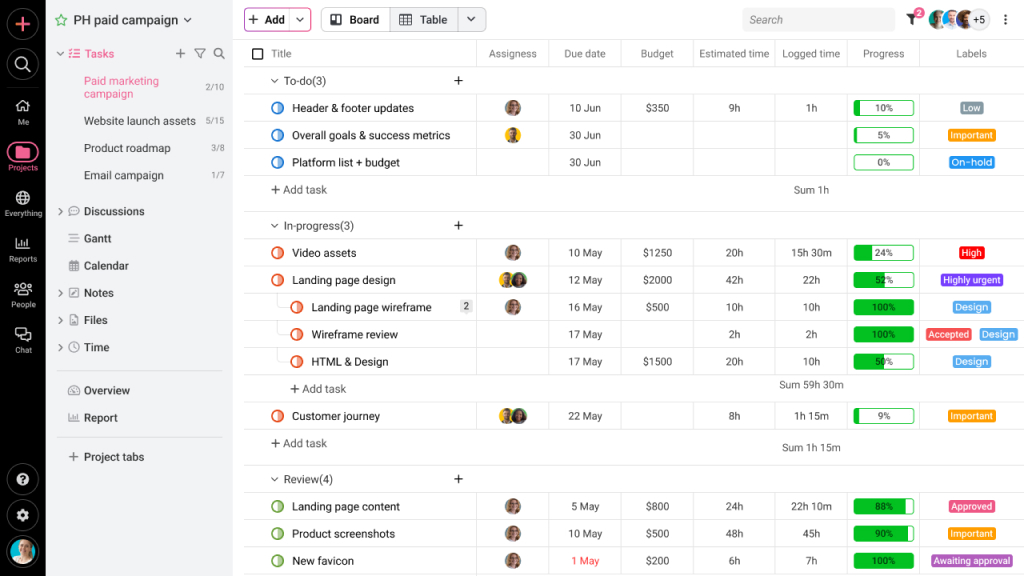
This makes sure that everyone on your team knows who’s responsible for what and when, reducing confusion in the workplace and making accountability part of the workflow.
Boost productivity, stay on schedule, encourage transparency, and save time with ProofHub! Sign up now for a 14-day free trial!
Tools to enhance leadership accountability
“Leadership is not about being in charge. It’s about taking care of those in your charge.” – Simon Sinek
And, to do so, you need the right tools. These tools will help you stay on track, align your teams, and achieve goals.
Here are some tools and frameworks that can help you stay accountable and inspire your teams to do the same.
1. Objectives and key results (OKRs)
OKRs help leaders set clear objectives (what you want to achieve) and key results (how you’ll measure success). They keep everyone on the same page and make sure that individual efforts contribute to the overall goal. OKRs make execution easier by breaking down big goals into actionable steps.
For example – If a marketing team is working on a new campaign and their objective is to “Increase brand awareness.”
Then, the key results can be:
- Achieve a 20% increase in website traffic within six months.
- Gain 10,000 new social media followers.
- Publish five thought leadership articles.
By defining OKRs, you can make sure that everyone on your team is working toward the same vision.
2. Accountability frameworks
Even the best teams need a reliable structure to stay accountable. An accountability framework provides guidelines on who is responsible for what and how progress is measured.
You can use the RACI (Responsible, Accountable, Consulted, and Informed) framework to make sure that every project has clear roles.
- Responsible: Who will do the work?
- Accountable: Who will make sure that it gets done?
- Consulted: Who will provide the input?
- Informed: Who will need updates?
This structure prevents confusion and ensures leaders stay accountable while giving their teams the flexibility to work independently.
3. Performance dashboards
Leaders can’t improve what they don’t measure. That’s where performance dashboards come in. These visual tools allow you to track key metrics, like project progress, deadlines, and goals, so you can see how things are going at a glance.
Tools like ProofHub offer project dashboards that make it easy to track tasks, deadlines, and team performance.
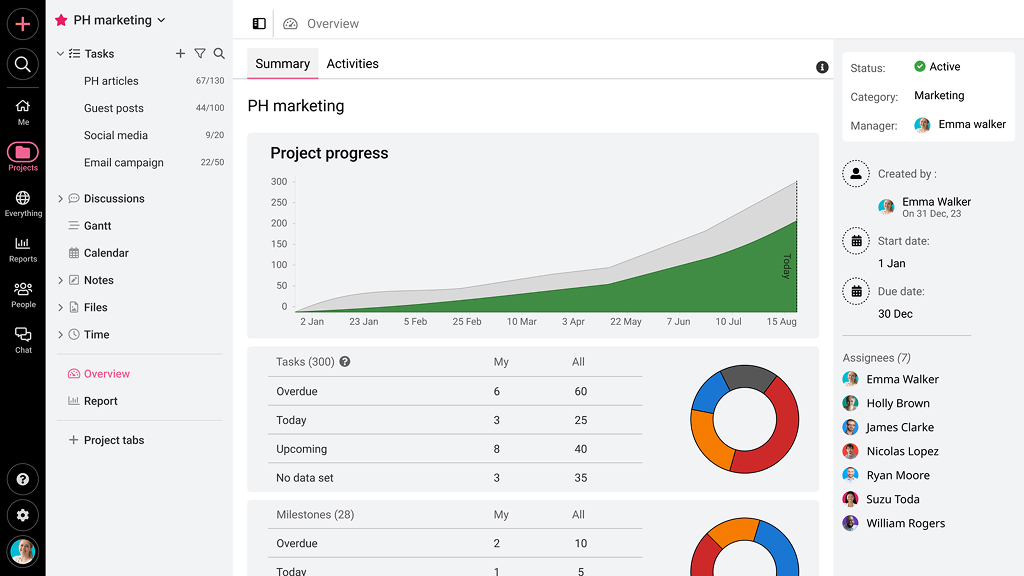
When everyone can see the same data, there’s no room for excuses. You can step in early to solve any issues, celebrate wins, and ensure accountability at every level.
4. Feedback systems
An open and constructive feedback helps leaders and teams grow. Regular feedback not only keeps leaders accountable but also builds trust within the team.
To do so, you can encourage your team members to share their feedback after completing a project. You can ask them to explain what went well and what could be improved next time.
ProofHub allows you to share your feedback in real-time, whether it’s a quick comment on a project update or a structured performance review.
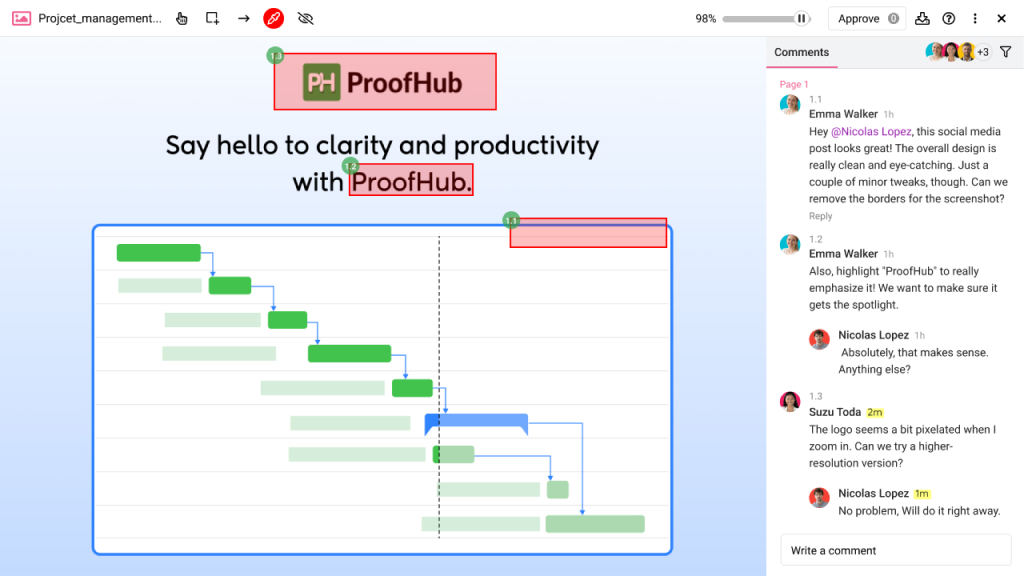
5. Project management tools
A leader’s accountability is more than their own personal performance. Leaders need to make sure that their team succeeds.
Project management software like ProofHub provides visibility into tasks, deadlines, and progress, helping you stay on track without constantly checking in.
ProofHub allows you to create and assign tasks, set deadlines, and track progress – all in one place. This transparency makes sure that everyone knows what’s expected of them and when.
Conclusion
Leadership accountability is all about taking responsibility when things go wrong, owning your decisions, leading by example, and building a culture of trust. When leaders hold themselves accountable, teams feel more engaged, work with more confidence, and collaborate effectively.
Accountability promotes transparency, strengthens relationships, and creates an environment where people are valued and motivated. When you, as a leader, embrace accountability, you inspire your team members to do the same, resulting in long-term success.
Of course, accountability becomes much easier when you have the right tools at your disposal! ProofHub allows you to track task progress, set clear responsibilities, and collaborate effectively with your team members – all in one place.
With its easy-to-use features for task management, real-time collaboration, time-tracking and progress tracking, ProofHub helps you stay on top of your responsibilities while keeping your teams aligned and motivated.
Lead your teams with accountability!
FAQs
How does accountability affect team performance?
When you hold your team members accountable, it boosts trust, clarity, and ownership. Everyone on your team knows their responsibilities, works harder, and delivers better results. Poor accountability results in confusion, missed deadlines, and lower morale.
What is the impact of leadership accountability on organizational culture?
When you, as a leader, model accountability, it sets the tone for the entire organization. You build a culture of trust, transparency, and responsibility. And, if you avoid accountability, you encourage a culture of blame and disengagement in your organization.
What is the role of leadership in fostering accountability in the workplace?
As a leader, your role is to set clear expectations, provide the right tools, and lead by example. You need to hold yourself accountable first, then encourage your team members to take ownership. Also, regularly check progress, give feedback, and address issues proactively to keep everyone on track.

